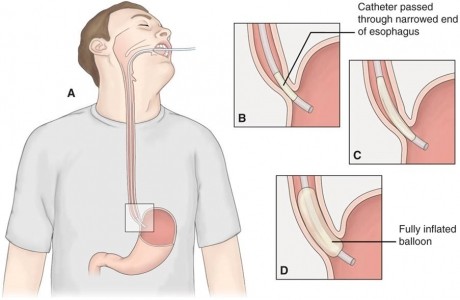We are Giving homeopathic treatment of achalasia cardia Online,If you are having symptoms of Achalasia cardia , don’t worry about that we are Giving homeopathy treatment of Achalasia cardia online. Send your detailed symptoms to us and our doctor will find out the best medicine for Achalasia cardia in homeopathy for you .
Know about this Problem:-
INTRODUCTION
Achalasia cardia is a rare motility disorder of the esophagus involving smooth muscles and lower esophageal sphincter. It is also termed as esophageal aperistalsis, cardiospasm, and esophageal achalasia. Failure of relaxation of smooth muscles of the lower esophageal sphincter due to defect either in nerves or the musculature leads to incomplete relaxation of the sphincter and no peristalsis. Achalasia cardia usually presents in adulthood and is very rare among children. Most of the cases are idiopathic and have no underlying cause associated.
SYMPTOMS
- Dysphagia– This is the most common and early presentation of achalasia cardia. Patient often complains of having difficulty in swallowing, sensation of something stuck in throat immediately after eating.
- Dysphagia can progress from inability to swallow solids as well as liquids in later stages.
- Odynophagia– Patient experiences pain as well as difficulty while swallowing. This is striking feature along with Dysphagia in symptoms of Achalasia Cardia.
- Chest pain and heart burn– is possible with heavy feeling in chest and discomfort after meals. This is known to mimic angina suggesting a heart ailment.
- Acid Reflux– Some of the food is brought back to the mouth – (regurgitation) which causes bad taste in mouth especially at night. This is observed in 80 % of patients.
- Weight loss and Malnutrition– is a prominent feature in symptoms of Achalasia Cardia observed in later stages of the disease mainly due to inability to eat.
- Nocturnal cough and choking occasionally– may be noted in cases of regurgitated food at night. This is peculiar feature in symptoms of Achalasia Cardia.
- Hiccups and Burping– is observed in about 10 % of cases.
- Sudden breathlessness, choking– can occur in acute stages if food has aspirated into the lungs.
CAUSES
The exact causes of achalasia cardia are still unclear. Achalasia cardia in an individual mainly occurs due to abnormal function of the lower esophageal sphincter due to improper relaxation and high resting pressure of the LES. Achalasia cardia is known to affect both muscles and the nerves which weaken and degenerate as the disease progresses. Various theories have been postulated in order to correlate the pathophysiology of achalasia cardia with the etiology. Some of these include:
- Genetic: Achalasia cardia is known to run in families and have a genetic predisposition.
- Abnormal Immune system: Certain auto immune responses in our body are known to cause considerable damage to the esophagus thereby weakening the muscles of the sphincter. This theory is more evident as individuals with other auto immune disorders are more prone to be at risk of achalasia cardia. This is one of the major causes of Achlasia Cardia.
- Nerve disturbances: Degeneration of certain nerves like vagus nerve and Aurebach’s myentric plexus can lead to dilatation of the lower esophageal sphincter causing achalasia cardia.
- Idiopathic: Most cases of achalasia cardia have no underlying cause of its own.
COMPLICATIONS
- Aspiration Pneumonia: This is the most serious complication of achalasia cardia but rare. In some cases due to sudden regurgitation process, gastric contents from the stomach enter in to the lungs leading to bronchopneumonia. Patient may present with sudden breathlessness, choking, vomiting episodes and respiratory distress.
- GERD– Long term immobility of the esophagus causing weakening of LES can lead to frequent regurgitation of the food contents to the mouth causing acid reflux disease. Patients normally present with epigastric pain, fullness after meals, water brash and indigestion.
- Esophagitis– Constant collection of food and gastric contents in the esophagus can irritate the mucosal lining causing inflammation of esophagus known as esophagitis.
- Perforation of esophagus– Chronic inflammation and irritation can also cause ulceration leading to formation of a hole in esophagus called esophageal perforation.
- Esophageal cancer: There is not much significant evidence medically about the correlation of esophageal cancer with achalasia cardia. However some patients who have been diagnosed with adenocarcinoma of esophagus have undergone dilatation procedure for achalasia conditions.
- Malnutrition: Prolonged weight loss due to inability to swallow liquids and solids can lead to significant weight loss which can affect the nutritional status of the individual.
HOMEOPATHIC TREATMENT
- Achalasia cardia is a rare form of motility disorder seen in today’s population but not very uncommon.
- Homeopathic system of medicine focuses on the internal derangement mechanisms which cause our body to break down and weaken, expressing itself outwardly in the form of symptoms in an individual.
- Homeopathic treatment for Achalasia Cardia has a lot to offer in special cases of achalasia cardia where patient’s condition and symptoms persists inspite of drug therapy or surgery.
- Certain patients have a tendency to poor muscle tone which makes them more susceptible to suffer from achalasia cardia. Homoeopathic medicines have excellent action on the muscles of the esophagus; they help in strengthening the muscles and improving the overall tone thereby correcting the underlying condition by homeopathic treatment for Achalasia Cardia.
- Symptoms of acid reflux, heartburn with swallowing difficulties are amazingly managed with our wonderful remedies in homeopathic treatment for Achalasia Cardia.
HOME REMEDIES of achalesia cardia
DO’S
- Maintain a soft or liquid diet which will make it easier to swallow while eating.
- Always chew the food nicely while eating and avoid gulping down the food.
- Maintain at least 2 hours interval between every meal.
- Keep 4 to 5 frequent small meals instead of having a heavy lunch or dinner as this helps in better digestion.
- Increase the amount of water intake in your daily routine.
- Always have your food while sitting upright.
- Use a big pillow at an angle of 30 degrees while sleeping at night to prevent acid reflux.
DON’TS:
- Avoid meals immediately before bedtime. Keep at least two hour gap between dinner and sleep.
- Avoid lying down immediately after meals as this can cause acid reflux.
- Do not hurry while eating or drinking.
- Do not skip meals or keep long gap between two meals.
- Avoid eating too much fried or spicy foods.
- Avoid habits like smoking, drinking.
- Do not indulge in habit of self-medication and avoid over the counter medications.
DIET and NUTRITION
Food to Include:
- Adopt for a softer and a pureed diet like soups, porridge, mashed vegetables as this will help in swallowing food better without any discomfort.
- Include foods rich in protein like chicken, fish, soya and eat more high fiber foods.
- Ginger plays an excellent role in helping digestion in our body and prevents heartburn.
- Dairy products like milk and yogurt work very well in easing symptoms of digestive discomfort.
- Pepper mint as an ingredient in teas and yogurt dips are known to help reduce gastric acid secretion and soothe the body.
- Thickened fluids like broth, stew, vegetables blended well or juices can be consumed.
- Drink at least 10 glasses of water daily to stay hydrated.
Food to avoid:
- Avoid fried and spicy foods as they act as irritants and worsen the symptoms.
- Avoid high carbohydrate foods like potatoes, cauliflower, wheat, rice as they are known to slow down the digestive process.
- Consume citrus fruits like lemon, oranges etc. in moderation as they are known to increase acid reflux.
- Reduce consumption of caffeine in your daily routine. Stick to 2 cups of tea or coffee daily.
- Avoid too much beverages and aerated drinks.




